Devon Roeper and James Lock help build a court in a dangerous area of Uganda that has helped the community thrive.
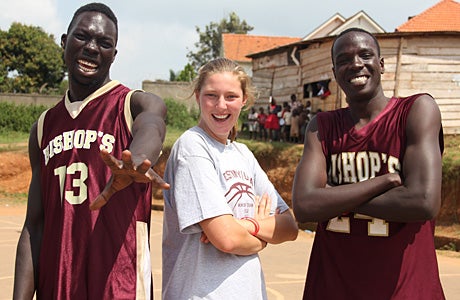
Devon Roeper (center), a standout basketball player at Bishop's in San Diego, helped organize an effort to use basketball to stabilize a dilapidated area of Uganda.
Courtesy photo
There was a parcel of land, once deemed a dark and evil place. It was overgrown with jungle vines and trees, allowing addicts to hide their drug and alcohol abuse, and thugs to conceal their criminal activity.
But two enterprising San Diego high school students had an idea.
Devon Roeper and James Lock decided to try to transform this village located in the outskirts of Mukono, a short distance from the Ugandan capital of Kampala, but 10,000 miles and a world away from their comfortable, upper-middle class lives.
They decided to do it by building a basketball court.
Think "Field of Dreams" — out of the corn stalks a baseball diamond was built, and they came. Out of jungle vines a basketball court was built, and they came.
By the summer of 2011 the site had been cleared and replaced by the first and only public basketball court in the region. While many residents still live meager lives there, residing in one-room houses with dirt floors and no running water, and kids wear tattered clothes and often don't have enough to eat, the court represents change.
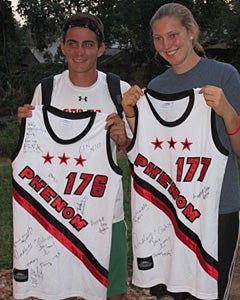
James Lock and Devon Roeper pose with
their Phenom jerseys.
Courtesy photo
The court has since become a gathering spot for the community, with men and women lining the perimeter of the court, watching hours of hoops. It is their YMCA, their town square. And it's become the catalyst for change in many lives. Between the various teams practicing and pick-up games, hundreds of kids — a lot from a nearby orphanage and school — fill the court on a daily basis.
"It amazed me how a basketball court could bring people together," said Roeper.
Roeper, who attends
Bishop's (La Jolla, Calif.), and fellow senior Lock, who goes to
Santa Fe Christian (Solana Beach, Calif.), were instrumental in raising funds and organizing the construction project in conjunction with the Children's Heritage Foundation, a Solana Beach-based nonprofit that helps disadvantaged children around the world.
Lock described the space before the court replaced it. "You couldn't walk through this area after 6 p.m. because kids would come and drink and do drugs," he said. "However, since the court has been built, it has become a place of hope for young people in the area. Kids are excited that they can use basketball to change their lives and do some good for their community."
Dean Roeper accompanied his daughter on both trips. He said the transformation to the entire community was powerful.
"The identity that these people have now associated with the basketball court brings some respect to the community, where previously the community was reviled for having a dark past, a lot of thuggery. This has kind of given them a rallying point."
Click 'Next' to read more.{PAGEBREAK}
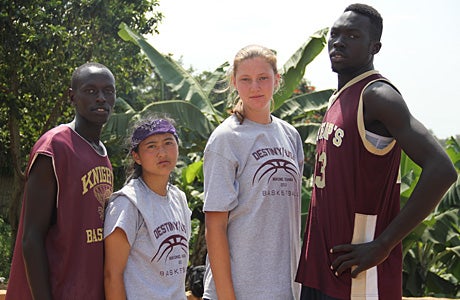
Melissa Peng (left) and Devon Roeper stand between two Ugandan players.
Courtesy photo
They have since formed a number of basketball teams, divided by age, skill and gender that compete in a league similar to AAU with other community teams in Uganda.
The American volunteers returned for two weeks in August and brought with them NYU point guard Melissa Peng and former Manhattan College player Kevin Laue, the first Division I one-handed ball player, among others. They came with 15 clinic-ready duffel bags filled with uniforms, shoes, basketballs, equipment and training aids like cones, jump ropes and speed ladders.
"The entire boys team has jerseys and shoes now," said Devon Roeper. They're working on outfitting the newly formed girls team, which was named the Javon Lady Phenoms after James and Devon. About 150 Phenom uniforms were donated by adidas, which holds the invitation-only Phenom basketball camps in the United States. These jerseys are distributed judiciously to those Ugandan players who have earned them. "It's a very, very coveted thing to have," said Dean Roeper.
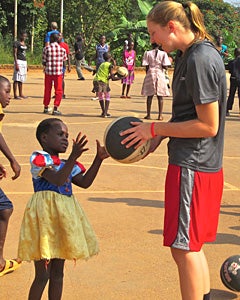
Roeper works with players of all ages.
Courtesy photo
Basketball has brought passion and purpose, particularly to the generation of 20-somethings who were robbed of their youth, missing out on years of education as a result of a 20-plus year war with the Lord's Resistance Army. Some were required to be child soldiers at the hands of the LRA and its leader Joseph Kony. The war ravaged northern Uganda, upsetting the fabric of the country, and has spread to other parts of Africa.
Morpheus, 22, is one of the players on the Phenom boys team. He used to be involved with drugs. He has never missed a practice, never missed a game. And through this team and daily basketball, he changed his life.
"He has something else to focus on and something else to work toward," said Devon Roeper.
"The young man, who was into some bad stuff, is now the heart and soul of the Phenom team, which has become his family," said Dean Roeper. "This is what he lives for, being part of this group of guys."
Henry is another member of the Phenom team. He has leukemia and has to travel hundreds of miles to Kenya for treatment. The Phenom team has become his family and support system. His doctors have benched him for now, but he still attends regular practices.
"Before this basketball team he didn't really have that much support behind him in his struggle with leukemia," said Devon Roeper.
The Ugandan girls, whose opportunities to participate in sports are limited, watched with interest as Roeper and Peng would compete against the guys.
"Culturally, they're not as empowered as men," said Dean Roeper. "To see these women (Roeper and Peng) hang with these very studly young men on the basketball court gives them all a different image of what a female athlete can be. I think it changes their view of themselves and it changes the view of the community of girls and young women, and what they can accomplish."
Click 'Next' to read more.{PAGEBREAK}
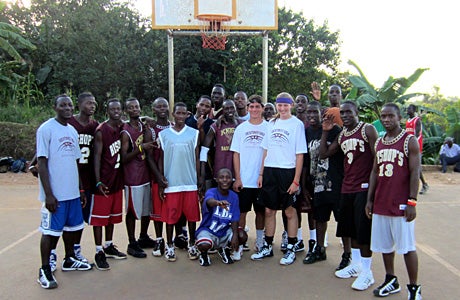
Roeper, Lock and some of the players that participated in the clinics last summer in Mukono, Uganda.
Courtesy photo
The group hosted two daily clinics for up to 125 youngsters ranging in age from 6-15, and another for approximately 30 older players. It was the desire of these uber-athletic young men that impressed Devon Roeper.
"To teach these 20-year-old guys who were so intent and they wanted to learn was remarkable to me," said Roeper. "The way they play basketball there, they're much more physical. They can run for hours in the hot Uganda sun. It was 90 to 100 degrees and they would keep playing for five hours without water breaks. They wanted to keep on playing. You couldn't take the ball out of their hands."
Peng, who played her high school basketball at
Westview in San Diego, said on her NYU basketball profile page that she was inspired by the Phenom teams because "they showed me that it's bigger than basketball and reminds me of why I play."
The highly decorated Roeper, who carries a 4.08 GPA, is Bishop's all-time leading scorer and rebounder. She was nominated for the McDonald's All American team. She's all-everything: division, league and California Interscholastic Federation. Despite having the credentials, the 6-foot-3 Roeper, who's averaging 17.8 points and 11.5 rebounds per game this season, wasn't sure how she would be received by the young men. She was aware of the attitude that girls are not as valued as boys in Uganda.
"At first I was a little nervous about that," she said. "I was wondering if they were actually even going to listen to me."
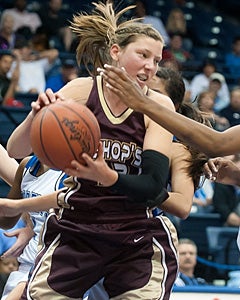
Devon Roeper playing for Bishop's in last
year's CIF championship game against La
Jolla Country Day.
Courtesy photo
But it didn't take long for Roeper, who will be playing Division I basketball at Columbia where she plans on studying international relations, to demonstrate her knowledge of the game.
"It took just a few minutes for me to show them a cool post move for them to pay attention to me the rest of the week," she said. "They wanted to soak up everything they could. Even on breaks they would come up to ask me to teach them more and more and more. It only took them a few minutes to realize they could learn something from me. Once they realized that, they were the most attentive people I've seen."
Roeper and Lock got an assist with the addition of the 6-foot-11 Laue, who was born with one arm. He was an example to the other players of how to overcome adversity.
"Kevin was a great asset to the trip," said Roeper. "The guys really bonded with him ... A lot of the guys found his story inspirational. They trusted him and wanted to learn more from him."
Lau's story was depicted in the documentary "Long Shot: The Kevin Laue Story." It premiered in October in New York.
"Helping coach in Uganda was truly one of the best experiences I've ever had," said Laue. "What (they) did for the locals there, by raising money to build a court, will have a lasting effect on their community."
Roeper and others are planning another trip back to Uganda this summer. They're raising money this school year in hopes of installing lights and bleachers during their next trip. But Roeper and Lock want the project to continue beyond the court and into the classroom. And they want it to continue beyond their graduation from high school.
They would like to see U.S. high school and college athletes partner with team members in Uganda. Roeper and Lock want a player or team here to sponsor a player there financially as a means of furthering their education. They plan on launching a Facebook page to raise funds to provide secondary and university-level schooling and vocational training for the female and male Phenom players.
"I want to leave a legacy," Roeper said. "I want San Diego to be able to embrace this project, as well as the Ivy League next year. This project has no limits of what it could do. My next goal is to provide education and use basketball as a tool to find those in the community who need help getting a job or getting university education and to provide that to them. I want this to be a high school, grass-roots fundraising operation, and not just led by adults. When I go to college I want this to outlast me in San Diego. I want the teams to continue to support the players and not just have the project end when I leave."